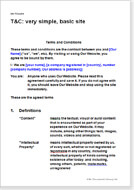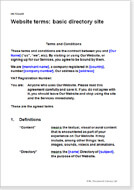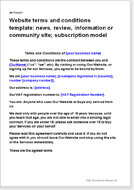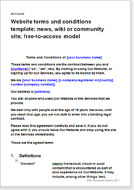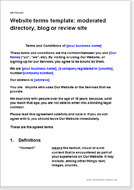Website terms: blogs, news & information sites
The following are terms for websites that publish news and information - whether a personal blog, a product review site or a news channel. They provide an acceptable use policy as well as protection for the intellectual property rights in the content you publish.
Website terms: simple information site
These are terms of use for a simple site that provides information only.
Limitation of liability provisions provide low level protection for your business and would make it difficult for someone to claim financial damage from you.
The template also provides contractual protection to all of your intellectual property.
Note that unless you can ask all your site visitors to agree to your terms (which is usually done at a point of contact or sale), this document is unlikely to be contractually binding.
Use this document for sites such as:
- a site that provides information about your products or services
- a reference site for hobbyists or enthusiasts
- a club or association website
Website terms: basic directory site
These are terms of use for the most simple directory site.
Use for sites such as:
- a local business directory
- listings of manufacturers of particular parts or products
Website terms and conditions template: news, review, information or community site; subscription model
Your site provides access to digital content, some or all of which is only accessible to subscribers. Your business model may also include advertising.
The content could be generated by you, your visitors, or others.
This document provides strong protection for your business, particularly if your visitors interact with your site such as asking or answering questions, or sharing experiences or content.
Use this document for sites such as:
- news and review sites where some content is only available to subscribers
- a forum accessible only by subscribers
- directories where access to the data is behind a paywall
- a library of reports or other information (such as records of company accounts and or share price history)
- information portals that give subscribers additional information (such as discount codes) or access to benefits, events or other resources, perhaps on preferential terms
Website terms and conditions template: news, wiki or community site; free-to-access model
Your site fosters a community that creates the content of the site. Importantly for this document, volunteer members also moderate the site.
Members may be required to register to access some or all of the functionality of the site, but there is no subscription.
Your business model is likely to be based on advertising or commissions from referrals.
This document contains strong terms to regulate your visitors’ interaction with your site and to protect your business.
Use this document for sites such as:
- user generated, free to use, directories or listings sites
- customer communities (such as those offering product support)
- collaboration sites such as those for software that bring together designers and engineers to develop a product or service
- wikis, where content is submitted and moderated by volunteers to create a reference library on a particular topic
- online fan clubs, providing news and discussion facilities
Website terms template: moderated directory, blog or review site
These are terms of use for a site that provides information with no registration or charge to access.
Your business model is likely to be based on sale of goods or services offline, advertising or commissions from referrals.
You may or may not allow visitors to contribute content, but content is moderated and approved by you before it is published.
Use this document for sites such as:
- a product information site of a manufacturer who does not trade online
- a personal or corporate blog
- a magazine or review site where articles have been written by approved writers
- a directory where the information is verified before publication

If the document isn’t right for your circumstances for any reason, just tell us and we’ll refund you in full immediately.

We avoid legal terminology unless necessary. Plain English makes our documents easy to understand, easy to edit and more likely to be accepted.

You don’t need legal knowledge to use our documents. We explain what to edit and how in the guidance notes included at the end of the document.

Email us with questions about editing your document. Use our Lawyer Assist service if you’d like our legal team to check your document will do as you intend.

Our documents comply with the latest relevant law. Our lawyers regularly review how new law affects each document in our library.
Terms and conditions that will protect your content
When you’re developing a website, it seems that there are a million and one tasks more important than writing your terms and conditions. However, they can be valuable in protecting the content you create and publish.
T&C are the agreement between you and your site visitor. Without them, it is much harder to protect your business if your site visitors behave in a way that is detrimental to it. That may be posting upsetting messages to your blog, or copying photographs or videos you have taken.
What you will find in our documents
All our T&C provide what could be called an Acceptable Use Policy, which sets out what visitors may and may not do when they interact with your site.
No term appears in every template we sell. Each document has been drawn to be relevant to the business we intend to protect.
Use of plain English strengthens the document
Consistent use of plain English and minimal “legalese” throughout helps because:
- you can set out clearly what your visitors can expect while on your site
- it prevent misunderstandings and makes solving disputes easier
- it makes a document easy for you to edit
Extensive guidance to help you edit the template
We include guidance notes that explain how to edit each paragraph. We know that there will be paragraphs that you will want to add to or edit because your site operates differently. There is no problem with that. We can also check your edits as part of our additional review service if you would like confirmation that they fit.
Restrictions on what a visitor may post to your website
Having strong security terms in a T&C document is not going to stop abuse, but it does:
- provide a deterrent to any misuse for which you could sue in court
- prevent you being blamed for criminal or nuisance activity
- reduce the chance of your being the subject of some bad social medium campaign - particularly important if your members can contribute content to your site that you might not moderate in real time
- present your site in a strong and purposeful way, giving out a message that you are not a “soft touch”
- assist in protecting you from civil or criminal charges for which you may otherwise be liable as a result of what someone else posts to your website
- provide permission for you to remove offensive content and generally stay in full control of what happens on your website
By using these provisions, we give you the best possible defence against anyone who claims he has been insulted, injured, or defamed.
Particular terms which are included where relevant
Disclaimers
We provide disclaimers. They are not always binding because you can disclaim only so far as the law allows and the law is complicated. We use disclaimers strongly but we use words that we hope will avoid upsetting your visitors.
Intellectual property protection
We provide the strongest protection for your IP rights, whether your content is simply words on a page or videos, photographs and perhaps systems.
Suitable for sites with international visitors
Our documents are written to cover international use because most websites are likely to attract visitors from across the world.
Every document is drawn under the law of England and Wales. Much is likely to be enforceable in many other legal jurisdictions as well.
Scotland and Northern Ireland have adopted the same law in the vast majority of cases, but we make no promises as to full compliance with Scottish law.
Advertising
If you are in publishing, your business model might include taking advertising in some way. Our documents do not regulate the terms of any advertising. That deal is between you and your advertiser, rather than between you and your visitors. But we do include general terms intended to protect you from a claim by a site user in respect of anything he or she might claim against you.
Basis of Contract
A contract is only formed if your visitor ticks a box to do so explicitly. No tick, no contract. Unless your website requires registration, you are unlikely to form a contract with a visitor.
So if you have a site that is entirely open to use, or even pages than can be explored before registration, it cannot be fully protected by any T&C document. Despite that principle, there are circumstances in which you could claim that your T&Cs apply, so it is always worth having them.
All rights reserved

